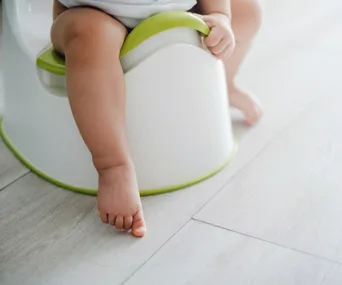By now, you will have heard and read a lot about developmental milestones to look out for in your child, whether it’s the major physical achievements like sitting, crawling and walking, or communication and social skills.
A range of environmental and genetic factors impact on the rate at which you will see your little one reach these milestones.
But one thing to keep in mind is that each child is unique and will develop at their own pace.
As useful or interesting as milestones can be for parents and early childhood professionals, they are only a guideline as there’s a wide range of what’s considered “normal.”

If your toddler is not jumping with two feet, that is considered something worth investigating. Image: Getty.
The flipside is that parents still need to be mindful if their toddler is straying a long way out of that normal range, and not ignore signs or “red flags” that continue to pop up – this is a crucial age for intervention if any developmental support is needed.
In addition to parental concerns, it’s often a professional carer or teacher who will first raise developmental red flags, as they are observing your child out of their home comfort zone and will be aware of various age-and-stage milestone ranges.
WATCH: Tips for dining out with toddlers. Continues after video …
So yes, every child will do things in their own time, but it might be an idea to talk to their doctor if your two or three-year-old:
Makes limited or no eye contact
Shows no interest in pretend play or play with other kids
Is unable to identify or understand feelings and emotions in themselves or others (ie. sad, angry, happy)
Is still not interested in or able to master self-care such as dressing, sleeping well or is an increasingly restrictive eater
Is difficult to understand when speaking and not using simple sentences
Is not running smoothly, taking stairs one foot at a time, jumping with two feet
Can’t build a tower of more than four blocks
Can’t kick or throw a ball
Has lost skills they previously had
Keep in mind there are so many reasons why you may be seeing any of the above red flags in your child, so before consulting Dr Google and losing your mind, talk to a real doctor or childhood specialist.


.png?resize=380%2C285)
.png?resize=380%2C285)